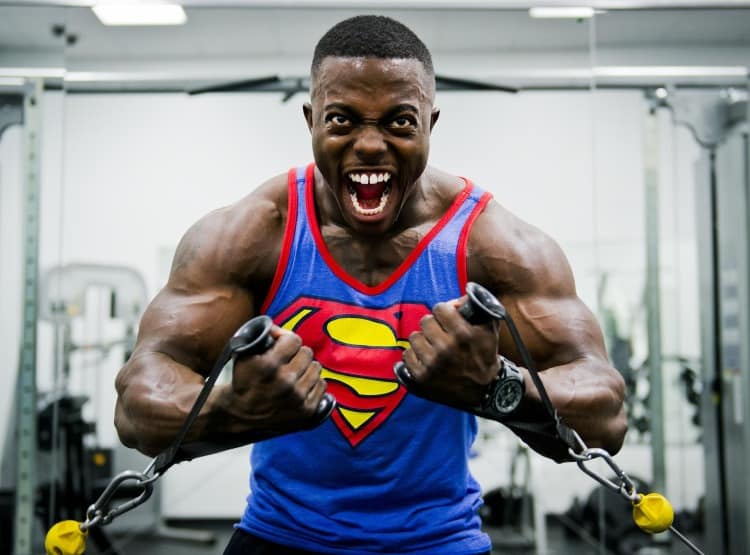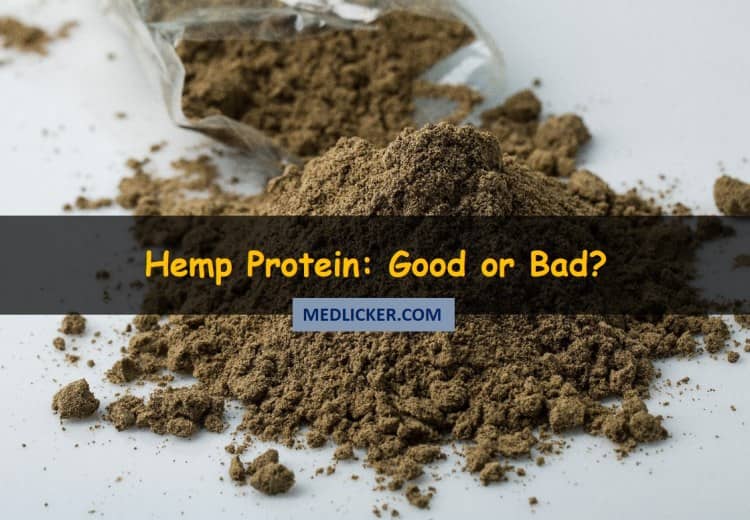Hemp protein: the ultimate guide
This is a detailed evidence based post on hemp protein, its benefits, amino acid profile and side effects.
What is hemp?
Hemp is an industrial variety derived from Cannabis sativa plant, the same plant from which marijuana is derived but it does not have its intoxicating qualities (1).
Hemp protein is an industrial byproduct of hempseed in which the seeds have their oil extracted and packaged as hempseed oil, and the leftover seed meal that has high protein content relative to the seeds is then manufactured and processed into hemp protein supplements (2).
Hemp is readily available in market and has very low content of THC (the psychoactive agent and intoxicating substance in Marijuana) and does not have intoxicating quality.
It contains up to ten percent fatty acids by weight (well balanced between omega-6 and omega-3 fatty acids and usually has high content of polyunsaturated fatty acids) so it is usually not a pure protein supplement and gives a higher natural fiber content compared to other protein supplements.
The protein part of hemp is not a full protein source, as it is low in lysine (which is the rate limiting essential amino acid); it also has quite low amount of leucine, but is appreciably high in both arginine and L-tyrosine (4).
Hemp has been found to contain cannabinoids, but these are cannabinoids that do not react with the two integral cannabinoid receptors in our body and are therefore unlikely to have the same neural attributes specific to marijuana. Hemp is a brilliant source of protein. It has a complete range of natural organic proteins, with twenty amino acids important in the human body. As an added bonus, hemp is free from oligosaccharides, the component that can cause upset stomach, indigestion, bloating and gas.
Hemp protein is made by grinding or milling the seed of the plant Cannabis sativa. This kind of hemp is has been certified to be free of THC, the commonly known intoxicating substance in the drug marijuana–you will not get “high” by ingesting hemp protein. Market demand for Cannabis sativa, made into food products and textiles, is increasing around the world.
Nowadays, hemp protein is considered to be a feasible meal replacement option and has the added advantage of having a high fiber content.
Hemp is has extraordinarily wide ranging uses as a crop and it can be grown for both non food and food purposes. Hemp seed, from which hemp protein is extracted, is composed of nearly thirty five percent protein, forty five percent oil and ten percent carbohydrates. Hemp seed has several nutritional benefits, according to agriculture and nutrition studies (5, 6, 7). Besides its health benefits, hemp is very eco-friendly, for it can be grown without the use of pesticides, herbicides, fungicides and it readily absorbs carbon dioxide.
Hemp protein is extracted from hemp seed and it is used as protein supplement with high fiber content that can be used to boost overall protein intake for both vegans and non vegans. Hemp is considered as a fine protein source owing to its high rate of digestibility, making it an ideal supplement for athletes. Other advantages of hemp protein include its anti fatigue and immunity enhancing traits and its benefits to human renal system.
Nutritional value of hemp
As mentioned before, the seed of plant Cannabis Sativa L. has been a significant source of nutrition for hundreds and hundreds of years in ancient cultures. Non-addictive or non drug varieties of cannabis, generally referred to as hemp, have been studied in great detail for their nutritional prospects in recent years.
To be precise a nut, hempseed in general holds over thirty percent oil and about twenty five percent protein content, with substantial amount of minerals, dietary fiber and vitamins (8).
In the digestive tract, proteins present in food are metabolized into amino acids. The amino acids are absorbed by human and built up into human proteins according to requirement and availability of the amino acids essential to make specific proteins.
Our body needs amino acids in ample quantity so that they can make proteins such as the globulins. Adequate amount of the right kinds may not be available to the body most of the time through regular diet. So even though your body may have enough essential amino acids available to avoid onset of nutritive deficiency diseases, it may not have enough to produce immunoglobulins compulsory for the immune system to combat infection.
Amino acid profile of hemp
The ideal way to ensure that your body has enough amino acids available to make the globulins is to eat diet having high concentration of globulin proteins. As hemp seed protein is 60% globulin edistin, and also includes amount of albumin, its protein is easily available in a form akin to that present in blood plasma.
Consumption of hemp protein provides the body with all the essential amino acids needed to maintain robust health, and gives the requisite variety and amounts of amino acids the body should have in order to make human serum albumin and serum globulins such as the immunity boosting gamma globulins.
Consuming hemp protein supplement could greatly help, if not heal, patients suffering from immune deficiency diseases. This is supported by the fact that hemp seed was used to treat nutritional decay brought on by tuberculosis, a potentially fatal nutrition blocking disease that causes the body to waste away.
Hempseed protein is a remarkably rich source of the two essential fatty acids (EFAs) alpha-linolenic acid (18:3 omega-3) and linoleic acid (18:2 omega-6).
The relative amount of omega-6 to omega-3 (n6/n3) in hempseed is usually between 2:1 and 3:1, which is considered to be most favorable for human health. Furthermore, biological by products or metabolites of the two essential fatty acids, stearidonic acid (18:4 omega-3; ‘SDA’) and gamma-linolenic acid (18:3 omega-6;‘GLA’) are also present in hemp protein.
The two chief proteins in hemp are edestin and albumin. These high-quality storage proteins and contain nutritionally significant amounts of all essential amino acids and are easily digested.
Hemp protein also has remarkably high levels of the amino acid arginine. Hemp has been used to cure several disorders for thousands of years in ancient oriental medicine (9, 10).
Hemp is not the only plant based protein source having all the essential amino acids in its embryonic seed. Protein derived from flax seeds also has all the essential amino acids as do many other seeds in the plant kingdom. What is exceptional about hemp seed protein is that 65% of it is composed of globulin edistin. That makes it unique and highest in the plant kingdom.
When assessing amino acid profile of the protein fragment, hemp appears to consist of (mg/g):
- Aspartate 1.35 +/- 0.23%
- Glutamine 1.73 +/- 0.32%
- Serine 6.03 +/- 1.24%
- Glycine 1.59 +/- 0.32%
- Valine 1.91 +/- 0.30%
- Proline 1.66 +/- 0.35%
- Alanine 1.61 +/- 0.32%
- Leucine 2.35 +/- 0.45%
- Threonine 2.66 +/- 0.67%
- Cysteine 0.70 +/- 0.15%
- Phenylalanine 1.62 +/- 0.30%
- Methionine 0.88 +/- 0.25%
- Isoleucine 1.45 +/- 0.23%
- Tyrosine 1.15 +/- 0.28%
- Arginine 94−128
When comparing amino acid profile with other protein sources, hemp protein is fairly high in tyrosine and arginine (greater than all other plant sources experimented) and is high in aspartic acid and alanine along with soy (both are higher than other sources).
Hemp protein is somewhat incomplete as even though it has all essential amino acids, some are present in inadequate quantity to provide the minimum amount required for essential human nutrition. The limiting amino acids in hemp protein appear to usually be lysine, and leucine and L-tryptophan being the second and third limiting amino acids.
Hemp protein typically contains about:
- 2200kJ (525kcal) per 100g
- 30.4 +/- 2.7% of fatty acids
- 24.0 +/- 2.1% of proteins
- Ash (4.8+/-0.7%) and non digestible fiber (22.2%).
Other bio-actives found in hemp protein include:
- Cannabidiolic acid and its parent molecule, (both non intoxicating)
- Cannabisin B at 6.6%
- N-trans-Caffeoyltyramine 3.3 % present in a 60% methanolic extract
Nutrients not seen as unique to hemp include:
- Sodium (12mg per 100g)
- Vitamin E (90mg per 100g)
- Thiamin (0.4mg per 100g)
- Phosphorus (1160mg per 100g)
- Potassium (859mg per 100g)
- Magnesium (483mg per 100g)
- Manganese and Zinc (7mg per 100g)
- Copper (2 mg per 100 g)
- Calcium (145mg per 100g)
- Iron (14mg per 100g)
- Riboflavin (0.1mg per 100g)
A lot of hemp oil can be derived from the seeds through cold-processing and sold as its own nutritional supplement, it is cold processed and the product is known as seed cake or seed meal and is about 10% fatty acids (oil) by weight with a relatively high protein content (30-50%).
Regarding fatty acid composition, hemp includes:
- 65% Linoleic acid in form of omega-6
- 22% Alpha-linoleic acid in form of omega-3
- 9% Oleic acid
- 4% Gamma-linoleic acid
- 2% Stearic acid
- 2% of an omega-3 fatty acid, Stearidonic acid
- 5% Palmitic acid
The omega-6 and omega-3 relative amount appears to be between 3:1 and 2:1. Hemp is among the few plant based sources of Stearidonic acid (the other major source is blackcurrant oil) (11).
Hemp protein appears to be an incomplete amino acid source, but has decent protein absorption rates. It is comparatively high in arginine and tyrosine and low in lysine and leucine.
Benefits of hemp protein
Fertility
Hemp protein is rich in amino acids and Omega-3 fatty acids which form building blocks of fertility hormones (12, 13). Omega-3 fatty acids are components of the all cell membranes in human body and are precursors of eicosanoids, which are imperative in the prevention and treatment of different diseases, especially in women.

Omega-3 fatty acids are beneficial in treating most common conditions affecting women. An increased ratio of prostacyclin and thromboxane produced by omega-3 fatty acid facilitates pregnancy in women with infertility problems by escalating uterine blood flow.
Hair
Nutritional value
Hemp contains omega-3 fatty acids, omega-6 fatty acids and omega-9 fatty acids. Taking such polyunsaturated fatty acids speeds up hair and skin growth. Hemp also has gamma linolenic acid present in it, which is good for fighting hair dryness and flakes (14).
Protein value
The high quality protein in hemp improves texture and overall look of your hair. Protein supplement provided by hemp improves the appearance and health of your hair, especially when it is rough and damaged. Besides strengthening hair, protein has emollient and water-binding characteristics that greatly improve hair health.

Hemp protein supplement can be used to enhance beauty of your hair from inside and outside. The oil is rich in essential fatty acids, along with vitamins and protein. Hemp is beneficial for people with all hair and skin types.
Conditioning agent
Use hemp protein supplements to condition your hair and your scalp. Hemp contains vitamin E, and high essential fatty acid content. Taking hemp protein can help get rid of dry scalp and reduce irritation. Hemp is especially good to use during winter season, when the air is chilly and cold and indoor heating systems are switched on because both of the increased heat can dry out your hair and skin and cause frizziness.
If you need more information about hemp use for hair, you may want to check out this detailed post.
Muscle
Bodybuilders require greater dietary protein intake than the regular athlete or gym going individual due to their intense training (15). Protein powders are an excellent way to ingest more protein without increasing number of meals. Most body builders use animal based proteins such as whey but plant-based proteins such as hemp protein are ideal for bodybuilders who are vegan or allergic and sensitive to other types of protein.
Hemp protein repairs and builds tissue and helps develop lean muscle mass. The proteins gained from hemp are akin to proteins found in the human body. Hemp protein has ample amount of globulins albumin and edestin, which are two of the most plentiful proteins found in the human body than any other type of plant-based source of protein. Unlike soy, hemp does not contain phytates and enzyme inhibitors, so the nutrients in hemp can be easily taken up and absorbed by the body.

Hemp protein has all ten essential amino acids necessary for robust health. Dietary protein is required to provide amino acids for development and maintenance of body muscle and tissue. Amino acids are the building units of protein and play an integral role in muscle repair and development of lean body muscles. The amino acids present hemp protein are pivotal to the make-up of enzymes, antibodies, and building blocks of tissues, hormones and blood protein. Hemp protein is also an excellent source of amino acids arginine and histidine necessary for muscle tissue growth. It is a high quality plant based source of branch-chained amino acids, required for repair and growth of clean, lean body tissue and muscles.
Hormones (GLA)
Studies in the 1980s observed that substances akin to hormones called prostaglandins play a vital role in facilitating the body to function smoothly. It was discovered that prostaglandins control inflammation and body temperature, help smooth muscles contract, and are essential to other body functions.
Gamma linolenic acid or GLA is known to be a key building block for various prostaglandins, and nutritionists have deduced that GLA supplementation is necessary for good hormone health, which is probably why many women suffering from premenstrual symptoms have benefitted from GLA supplements.
Hemp protein is rich in GLA.
Joint pain and arthritis
According to a six month study published in the journal of Arthritis and Rheumatism, consuming the exceptional GLA found in hemp protein assuaged arthritis symptoms by twenty percent when compared to placebo treatment at only three percent. This along with the bonus that hemp protein has an ideal ratio of omega-3/6 fats along with its other nutrients help naturally bring down inflammation (16).
For treatment take one teaspoon of hemp seed oil per day along with some quality fish oil.
Weight loss
Hemp can curb unusual hunger cravings and can help you feel fuller for a longer period of time and decrease sudden sugar cravings. According to some experts, taking four teaspoons of hemp protein powder can greatly help satiate hunger and reduce body weight (17).
Digestive health
Whole hemp seeds can aid digestion. Fiber is a vital part of the diet and is associated with better digestive health. Whole hemp seeds are an excellent source of both soluble (20%) and insoluble (80%) fiber .Soluble fiber assembles into a gel-like material in the gut.
It is an indispensable source of nutrients for the friendly digestive bacteria, and may also decrease spikes in blood sugar and help regulate cholesterol levels (18).
Having high content of soluble and insoluble fiber, hemp protein provides more than enough bulk to regulate your gastrointestinal system and keep it running smoothly like clockwork. In addition to this, this healthy source of roughage feeds the probiotics in your intestinal tract and helps ensure a healthy immune system.
Healthy skin and nails
Hemp protein benefits for hair, skin and nails go a long way at treating dry, red, flaking skin. Featured mostly in high-quality cosmetic products, hemp is often included in lotions, soaps, creams, lipsticks, lip balms and soaps. Hemp protein is known to make a way into the endodermis or inner layer of the skin and facilitate healthy cell growth; paving way for soft, smooth skin.

Since hemp protein is also valuable for treating skin maladies such as eczema and psoriasis, to maximize these advantages it is a smart idea to eat a couple tablespoons of hemp supplement regularly every day and then mix up a homemade skin ointment or cream combining hemp seed oil, lavender oil, shea butter and other oils that might strike your fancy.
Cancer
Owing to its optimal fatty-acid profile of omega-3 fats and GLA, this naturally aids in balancing inflammation levels and strengthening the immune system (19).
The American Journal of Cancer reports that THC in hemp protein can block progress and possibly reverse glioblastoma multiforme (a fatal type of brain cancer). The journal of British Cancer Research and Treatment states that THC in hemp seeds improved advanced stage breast cancer. Researchers from the University of Frankfurt, Germany found that the same hemp seed provides relief and cure of lung cancer.
After evaluating the research, using hemp supplement could be part of a healthy anti-carcinogenic diet and natural therapy plan (20, 21).
Cardiac health
Heart disease is the number one cause of deaths over the world. Some of the integral ingredients in maintaining a healthy heart include plant based protein, fiber, healthy fats and less consumption of sugar. Hemp protein containing hempseeds has all these traits and qualities (22).
Consumption of hemp protein may alleviate the risk and threat of heart disease through various mechanisms such as:
- It consists of high amounts of the amino acid arginine, which is used for production of nitric oxide in the body. Nitric oxide is a gaseous substance that makes the blood vessels dilate and relax, leading to lowered levels of blood pressure and consequentially, a lowered risk of heart disease.
- In a large group study comprising of more than thirteen thousand people, increased amount of arginine intake was allied with reduced levels of C-reactive protein (CRP).(3)[iv] C-reactive protein is an inflammatory marker associated with heart disease.
- The gamma-linolenic acid present readily in hemp protein has also been related with decreased inflammation of heart vessels, which may decrease the risk, severity and onset of heart disease and cardiac disorders.
Dieticians and nutritionists recommend adding about two tea spoons of hemp protein supplement to a morning smoothie as a homemade remedy to naturally lower blood pressure, improve triglycerides, lower levels of LDL cholesterol and raise HDL cholesterol. Apart from this, lab studies have proven that hemp protein powder or hemp seed oil may decrease blood pressure, lower the possibility of blood clot formation and help heart heal and recover after a heart attack or cardiac episode.
In conclusion, hemp protein is an excellent source of arginine and gamma-linolenic acid, which have been related with a decreased risk of heart disease.
Eczema
Medical research has shown that giving hemp protein or hempseed oil to patients suffering from eczema may help improve blood concentration levels of essential fatty acids. It may also provide relief from itchiness, irritation, improve dry skin and reduce the need for skin medication (23).
Bottom line: Hemp protein is rich source of fatty acids. Having an ideal 3:1 ratio of omega-6 to omega-3, which may help treat skin disorders. In some cases, it greatly helps in providing relief to eczema patients from its uncomfortable manifestations and symptoms.
Hemp seeds are a great source of plant-based protein
Almost twenty five percent of calories in hemp seeds come from protein, which is relatively high. Based on weight, hemp seeds provide amount of protein almost equal to beef and lamb. Twenty grams of hemp seeds, or two to three tablespoons, provide almost 11 grams of protein.
They are known as a complete plant based protein source, which means that they provide all ten essential amino acids. Essential amino acids are not manufactured in the body and need to be provided to body from the diet. Complete protein sources are very difficult to find in the plant kingdom, as plants often do not have the amino acid lysine.

Quinoa is another example of an ideal plant-based protein source. Hemp seeds contain considerable amounts of the amino acids methionine and cysteine, as well as high levels of glutamic acid and arginine. The digestion of hemp protein is also very easy— better than protein derived from many grains, nuts and legumes. Bottom line is that about twenty percent of calories in hemp seeds are based on protein.
Hemp seeds may reduce symptoms of PMS and menopause
Up to eighty percent of women of reproductive age may suffer from psychological and physical symptoms brought about by premenstrual syndrome (PMS) (24). These symptoms are very likely manifestations of sensitivity to the hormone prolactin. Gamma-linolenic acid (GLA), present in hemp protein, produces prostaglandin E1, which alleviates the effects of prolactin.
Reduced risk of diabetes
Insoluble fiber adds roughage and bulk to fecal matter and might aid food and waste pass through the intestinal tract easily. Ingestion of insoluble fiber has also been known to reduce onset of diabetes (25).
Side effects
The pros of hemp protein are manifold but it also has some cons:
Gastrointestinal disturbance
Despite of the fact that hemp protein is a natural product it may cause gastrointestinal distress (26). You may experience:
- Loose, watery stools
- Diarrhea and upset stomach
- Abdominal cramping
- Bloating.
This gastrointestinal discomfort is mild in nature and gradually diminishes. However, consumers with pre existing GIT disorders should be wary as hemp protein consumption may worsen already present symptoms.

They should consult their doctor before taking hemp protein.
THC metabolites in urine
Hemp contains the psychoactive agent, THC in small amount. This has produced concern over whether regular consumption of hemp protein could contribute to testing positive on drug tests. Experiments have confirmed the presence of THC metabolites in urine after ingesting hemp products.
THC sensitivity
People highly sensitive to THC may feel its effects, such as hallucinations or feelings of well-being, especially when consuming hemp protein regularly. That is why never take more than the recommended amount.
Whey protein vs. hemp protein
There is a lot of debate surrounding whey versus hemp protein. For several years, whey has been known for being the most bio-available protein source. But recently, studies have shown that whey protein (27, 28):
- Is not easily digested by human body
- Causes intestinal disturbance and toxemia
- Causes abdominal discomfort and bloating
- It may actually increase your waistline. A malfunctioning intestinal tract decreases amino acid and any other nutrient absorption in body and cells. Therefore, the more protein enters your system, the more it will store in your gut and release toxic waste. Also, whey protein supplements are chock full of a plethora of chemical substances and non-digestible sweeteners added to make the protein powder taste better.
Hemp protein on the other hand is a natural supplement. It may also cause some gastrointestinal issues but they are of much milder nature than the ones caused by whey protein.
- It is natural – There are no artificial sweeteners or additives, chemicals or toxins that will disturb intestinal absorption or effect optimal health and nutrition. THC content is negligible, so there will be no undesirable stimulating effects.
- It is a complete protein as it contains all essential amino acids for improved metabolic activity, muscle repair, and general wellbeing.
- Bio-availability – hemp is a whole food supplement which is plant based and that is rich in enzymes and essential fatty acids essential for muscle growth and fat burning. As most hemp proteins are not heat processed (unlike whey), they contain enzymes which are required to synthesize amino acids for building muscles.
- Essential fatty acids – Hemp protein has the ideal 3:1 ratio of omega 6 and omega 3 fatty acid. GLA is also present which is crucial for hormone balancing.
- Being a plant derived protein it contains chlorophyll and alkalizes your body to regulate your pH level and keep you healthy and fit.
- High fiber content and beneficial bacteria – it controls blood sugar levels, satiates sudden food cravings and helps to abolish bloating and intestinal sludge.
Conclusion
Hemp protein is a valuable source of amino acids, healthy fats and fiber for our body. It has lots of benefits and promotes fertility, hair health as well as skin and cardiac health. It is also beneficial in dealing with diabetes complications and may be used as auxiliary treatment in various types of cancers, such as glioblastoma multiforme. As it is a natural plant based protein it does not have too many gastrointestinal side effects but some people may suffer from various gastrointestinal problems such as bloating after consuming hemp protein. These side effects are usually mild in nature and last only temporarily. However we do recommend asking your physician first before taking any hemp protein supplements.
| Written by: | Michal Vilímovský (EN) |
|---|---|
| Education: | Physician |
| Article resources: | See numbered references within the article |
| Image resources: | Dollarphotoclub.com and Pixabay.com |
| Published: | January 2, 2016 at 4:21 PM |
| Last updated: | March 14, 2016 at 9:30 AM |
| Next scheduled update: | March 14, 2018 at 9:30 AM |
Get more articles like this in your inbox
Sign up for our daily mail and get the best evidence based health, nutrition and beauty articles on the web.


Ache in left arm that you should not ignore
Alkaline water dangers: why you should not drink it
How to Avoid Sleepiness While Studying?
23 Foods That Increase Leptin Sensitivity
Low dopamine (e.g. dopamine deficiency): causes, symptoms, diagnosis and treatment options
Swollen taste buds: the ultimate guide to causes, symptoms and treatment
Thin endometrial lining: causes, symptoms, diagnosis and treatment
Pimples inside nose: the complete guide
Holes in tonsils: definition, symptoms, treatment and prevention
How to deal with an ingrown hair cyst
Allegra vs. Zyrtec vs. Claritin
How to get rid of phlegm (excessive mucus) in throat? Detailed guide to medical and home remedies, symptoms and causes
What causes stomach ache after meals?
Allergy to penicillin and alternative antibiotics
Liver blood test results explained